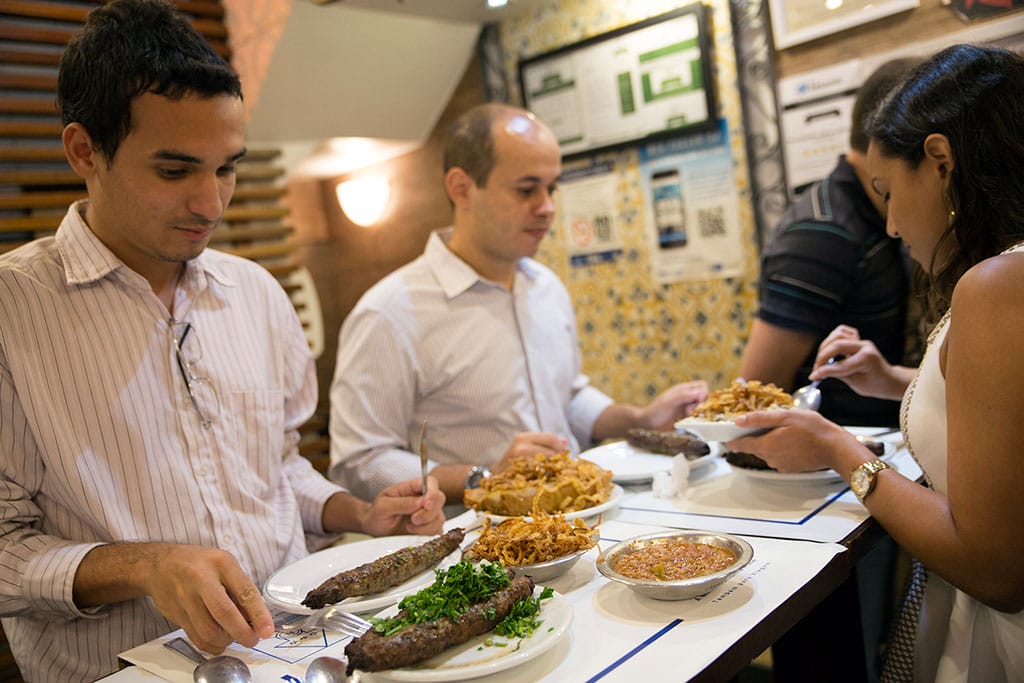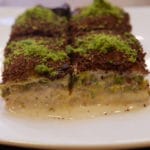On a Monday at 1 p.m., private equity investor Nargilla Rodrigues and her two colleagues bring a fourth co-worker to the Rotisseria Sírio Libanesa in Rio’s Largo do Machado neighborhood to initiate him to their weekly lunch ritual. An army of diners in business attire have packed the small restaurant and clump around the to-go counter. Rodrigues grabs a standing table and fires off an order of stuffed cabbage leaves, kafta and lentil rice like they are shares in a fire sale.
With the same auctioneer’s speed, but a deeper boom, Antonio Oliveira, an employee at the restaurant for 19 years, sends the order back to the kitchen. Soon the bankers’ small table is overflowing.
“The best thing about this restaurant?” Rodrigues ponders the question, scanning the faces of smiling staff, the photos of Syrian mosques laminated to the walls and chattering customers filing in and out. “The kafta,” she says decidedly.
It’s a beef kafta (also known as köfte, among other spellings): smoky, well-seasoned and tender throughout, topped with chopped mint and white onions. Her co-worker on the inaugural visit, mouth full, nods deeply in agreement.
 The recipes for kafta and over 20 other menu items were passed down by the Syrian brothers who founded this restaurant. In 1977 they sold it to then-employees and Portuguese immigrants Arlindo Freitas da Costa and João Rocha Pereira. The menu has changed very little since the place was founded in the 1960s, says Pereira: “If you want something else, you can go somewhere else.”
The recipes for kafta and over 20 other menu items were passed down by the Syrian brothers who founded this restaurant. In 1977 they sold it to then-employees and Portuguese immigrants Arlindo Freitas da Costa and João Rocha Pereira. The menu has changed very little since the place was founded in the 1960s, says Pereira: “If you want something else, you can go somewhere else.”
Because the founders came from Syria, the recipes included labneh, known here as coalhada seca – the strained and thickened yogurt that can be eaten with pita, onions and mint – along with more widely known Syrian foods in Rio such as triangle-shaped esfiha pastries and both oblong and pan-baked kibe.
In the early 20th century, more than 100,000 people from Syria, Lebanon and nearby countries immigrated to Brazil, most of them economic migrants fleeing uncertainty in their countries after the breakup of the Ottoman Empire and through World War II. This means many Syrian foods have become standard in corner snack bars, called lanchonetes. You’ll need to go to a place like Rotisserie Sírio Libanesa, however, to find cabbage leaves stuffed with rice, tomato and beef, or a beloved rice and lentil dish topped with a tangle of crispy, slivered fried onions.
Many simply call the Rotisseria Sírio Libanesa “the Arabe,” an umbrella term for Middle Eastern culture that has become commonly used in Rio over the decades. The restaurant’s one location serves an estimated 1,000-plus esfihas per day, and people come from all across the city to eat, often standing at the counter and often ordering food to go. It is Syrian food as most cariocas experience it: fast, affordable and a normal part of the Rio diet.
Familiarity with Syrian culture due to the early 20th-century migrants, seen in blockbuster restaurants such as the Rotisseria Sírio Libanesa and in the SAARA open-air market in Old Rio, has helped pave the way for attitudes about new Syrian refugees coming to Rio. Pereira is quick to praise the other Syrian restaurateurs in Rio and says that because of Brazil’s profile as a humanitarian country, he envisions the new refugees integrating well. In Brazilian president Dilma Rousseff’s recent address to the U.N., she said Brazil had “open arms to refugees,” and special refugee application guidelines have allowed roughly 2,000 Syrian refugees from the current conflict to register in Brazil.
 One thing that affirms Pereira’s respect for Syrian culture is the way customers respond to Syrian recipes. Despite Brazil’s economic crisis, they keep coming. Pereira stresses that he takes special care to keep the quality of ingredients high. He imports chickpeas from Mexico, lentils and flour from Canada and fresh cheese for the soft, baked, wildly popular cheese esfiha from the Brazilian state of Minas Gerais. A rare menu addition over the years has been a house brew of Brazilian maté, sweet yerba maté tea, that in this case has less sugar and more flavor than most found in Rio. With takeaway orders, Pereira says, the restaurant serves over 6,000 liters of maté per day.
One thing that affirms Pereira’s respect for Syrian culture is the way customers respond to Syrian recipes. Despite Brazil’s economic crisis, they keep coming. Pereira stresses that he takes special care to keep the quality of ingredients high. He imports chickpeas from Mexico, lentils and flour from Canada and fresh cheese for the soft, baked, wildly popular cheese esfiha from the Brazilian state of Minas Gerais. A rare menu addition over the years has been a house brew of Brazilian maté, sweet yerba maté tea, that in this case has less sugar and more flavor than most found in Rio. With takeaway orders, Pereira says, the restaurant serves over 6,000 liters of maté per day.
Rotisseria Sírio Libanesa’s doors have remained open as the neighborhood has developed around it and boomed with the arrival of the Largo do Machado metro station. Its staff has seen presidents come and go. In 1964, when Costa was a new employee, he says that he remembers news of President João Goulart being led away from his nearby palace at the beginning of Brazil’s dictatorship. The fact that Sírio Libanesa, with much care for detail, is still steaming ahead is auspicious for the new Syrian arrivals who may try their hand in Rio’s food industry.
Published on December 01, 2015
Related stories
March 10, 2020
Mexico CityThe place smells like a wet dog. The fishmongers have long grown accustomed to it, but the uninitiated are assaulted by the full force of Mercado La Nueva Viga’s funky barnyard smell almost from Eje 6, the congested avenue were we turn into the entrance. The trick, we find, is to walk quickly into one…
November 10, 2021
IstanbulIstanbul's dessert culture mirrors the richness of its broader culinary diversity and depth, and the city is home to numerous classic establishments that have essentially perfected favorite Turkish sweets. There’s Özkonak’s tavuk göğsü, a dense, thick pudding made with shredded chicken breast and topped with cinnamon, and Mahir Lokantası’s irmik helvası, a subtly sweet mound…
October 31, 2023
LisbonIf there’s one Portuguese ingredient familiar to all, it’s probably salt cod. And if there’s one Portuguese salt cod dish that’s best known, it’s likely bacalhau à Brás. Why has this particular dish – salt cod scrambled with eggs, onions and matchstick potatoes – risen to the top? “It’s the most democratic,” theorizes chef Luís…



















































































